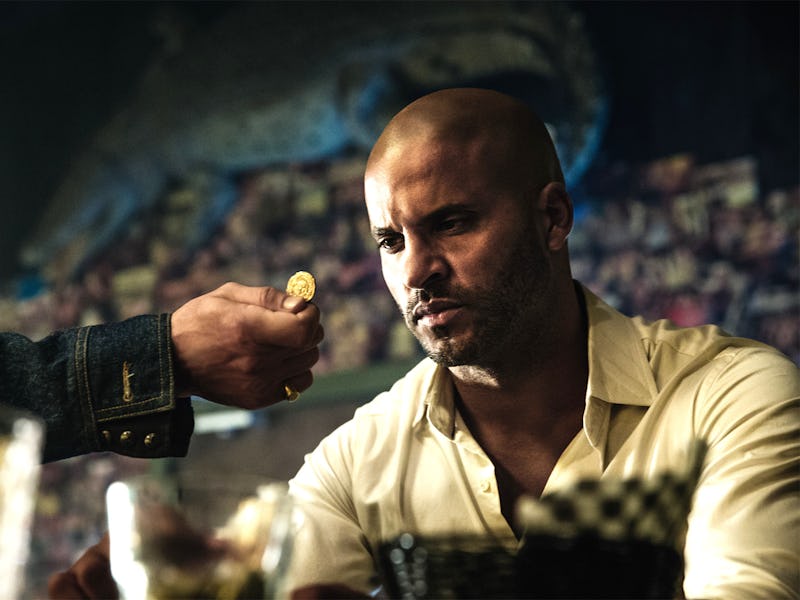Thank God Shadow Has a Personality in 'American Gods'
How Ricky Whittle's Shadow makes the show better than Neil Gaiman's book.

Halfway through the third episode of Starz’s American Gods, Shadow Moon has a temper tantrum about marshmallows. Right before he’s supposed to rob a bank with his employer Mr. Wednesday, he hands Shadow a cup of hot chocolate and asks if he likes marshmallows. Annoyed, Shadow responds, “Why are you talking to me about marshmallows? Like I’m worried about marshmallows.” Then sighing with the weight of the world on his shoulders, he says, “Yeah, I like marshmallows.”
It’s a funny moment, but if you consider it in relation to Neil Gaiman’s novel — on which the show is based — it’s out of character. The taciturn ex-con protagonist in the book would never do that. And, typically, when dealing with page-to-screen adaptations, sentiments of “but in the book!” are negative. But in Bryan Fuller and Michael Green’s glossy, splashy rendition of the urban fantasy epic, this is an inspired move. The story would not work as a television show if it stayed true to Shadow’s characterization. Thank the gods Ricky Whittle didn’t.
Ricky Whittle as Shadow in 'American Gods'
Quirky name aside, the Shadow of Neil Gaiman’s novel isn’t exactly Mr. Personality. As a racially ambiguous man with a blank-slate personality, he’s the ultimate everyman made literal. Prior to the events of the story, he occupies a blue-collar space — he works at a gym called the Muscle Farm, and his grand plan for getting out of prison involves taking a bath, fucking his wife, and sending out for pizza. He’s also a little more refined, however, since he spent his childhood traveling around and reading. He exists in between categories and stereotypes, because his toes dip into every corner of the American melting pot.
As a result, when he ends up on a road trip, the reader doesn’t see roadside attractions like the House on the Rock through the lens of a particular cultural viewpoint. And when he ends up in the middle of a war between Old Gods from mythology and New Gods like Technical Boy and Media, he’s a truly impartial figure.
While that works on the page, a show can’t have an impartial, blank-slate protagonist who is so non-reactive that he’s practically catatonic. Wisely, American Gods realizes this. The first two episodes have more overtly addressed Shadow’s racial identity, which enables it to engage in its relationship with American history in a more direct way. Most revolutionary of all, Shadow has genuine feelings and reactions to the surreal events he’s become entrenched in.
In the book, when his wife dies and fantastical events happen, he responds with a shrug and a bemused sense of acceptance. In the show, he visibly grieves his wife (even stopping to yell to the sky in the first episode) and reacts to Wednesday’s statements, like, “we’re going to rob a bank,” with sentiments like, “What the fuck?”
Shadow and Wednesday in 'American Gods'
Adding a “what the fuck” element is crucial to bridging the gap between Shadow and the audience, who is naturally rendered into a permanent WTF stage. Because of Shadow, American Gods achieves the rare status of a show that improves upon its source material by being unafraid to change it. And if there’s any story that benefits from knowing that nothing is holy, it’s this one.
American Gods is currently airing Sunday nights on Starz.